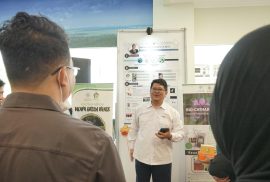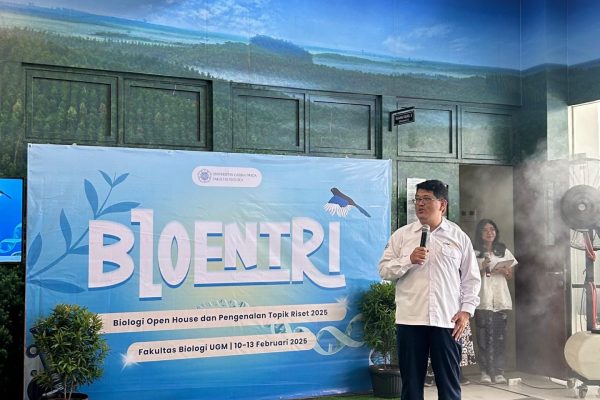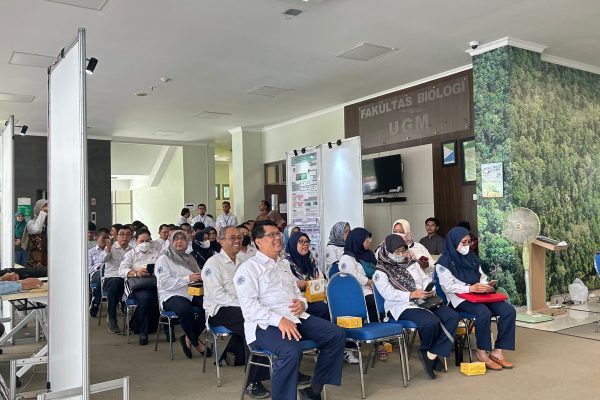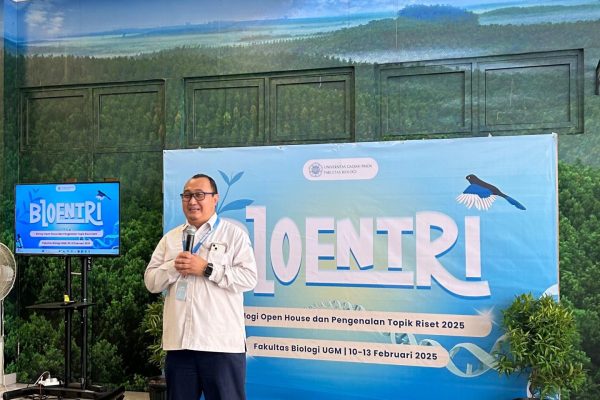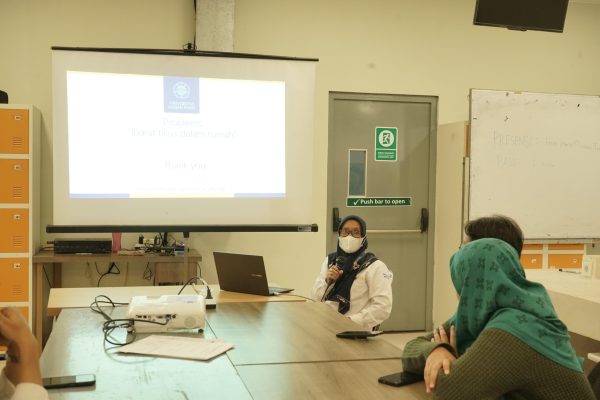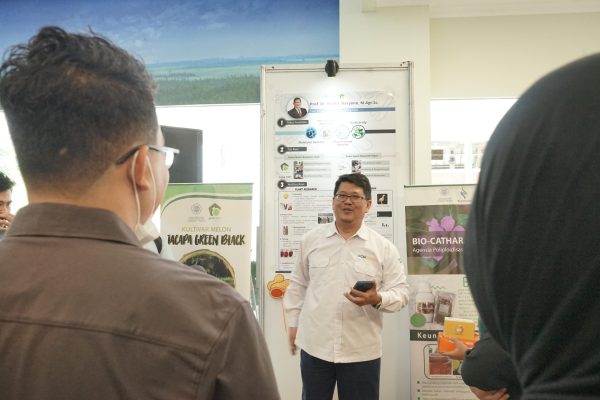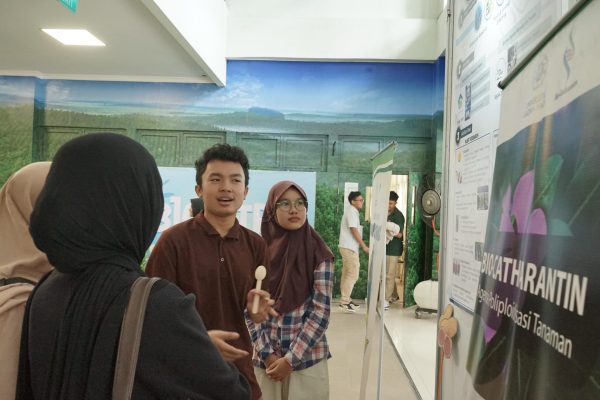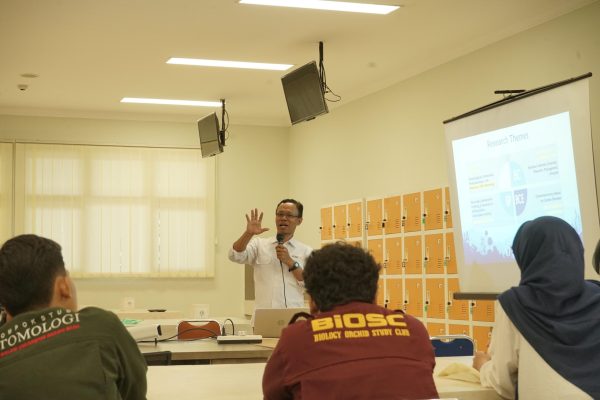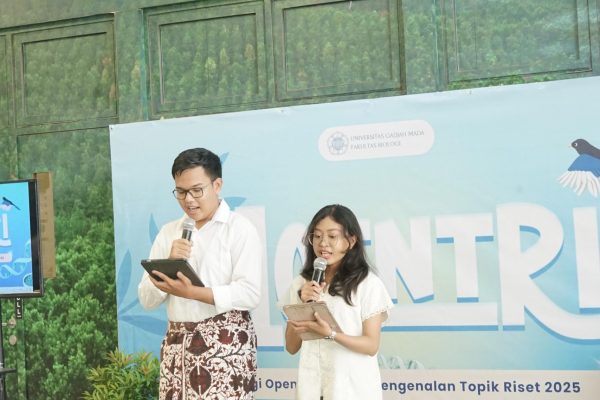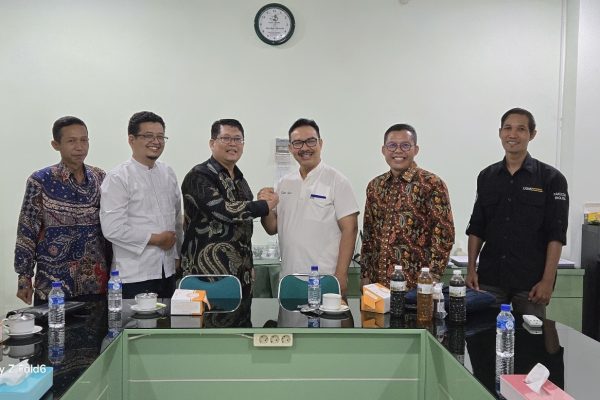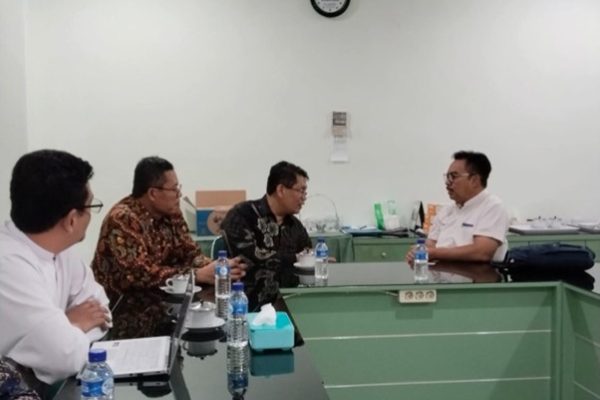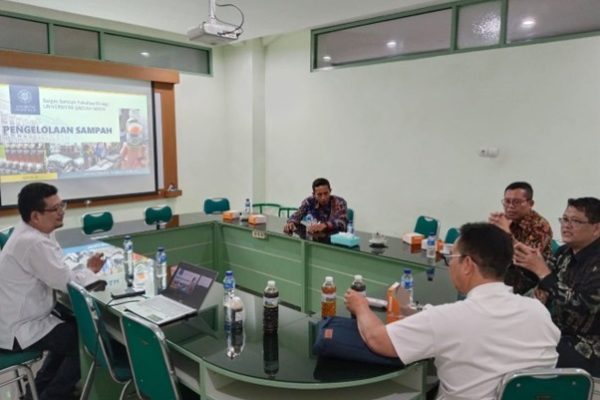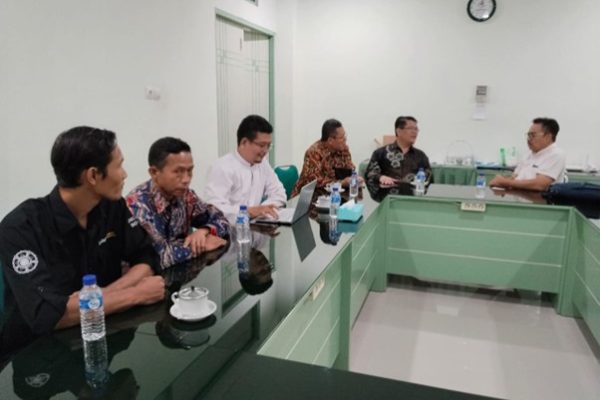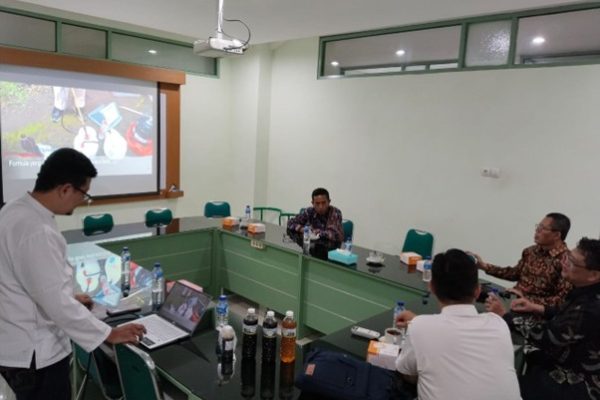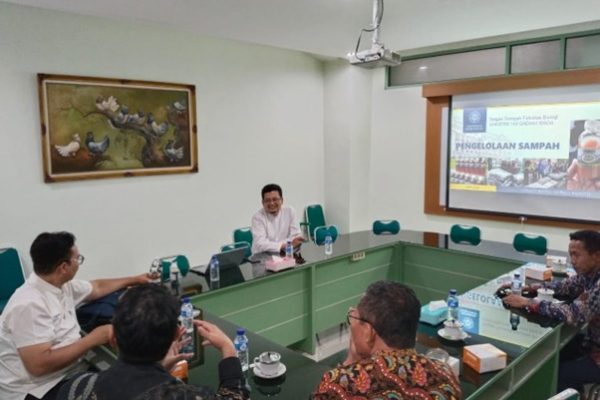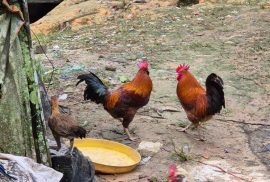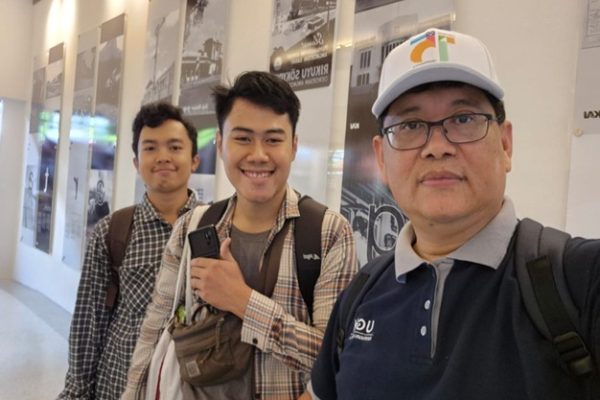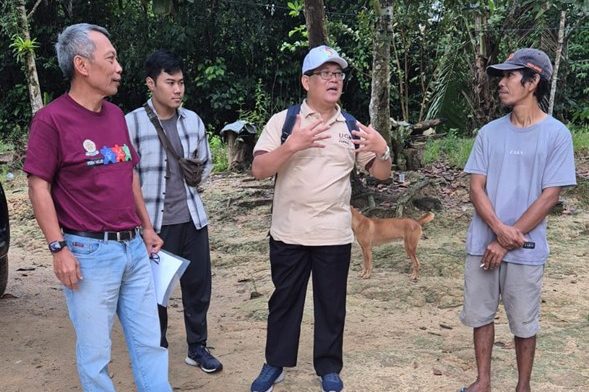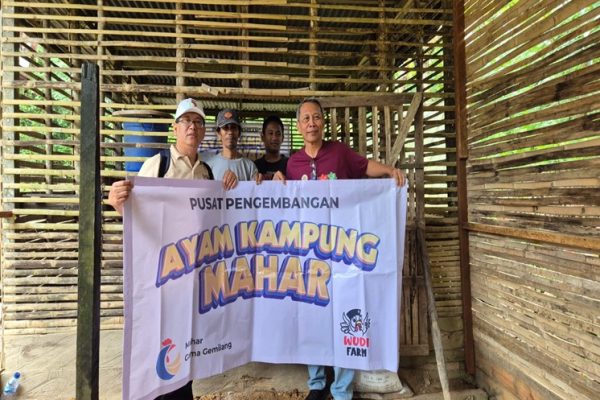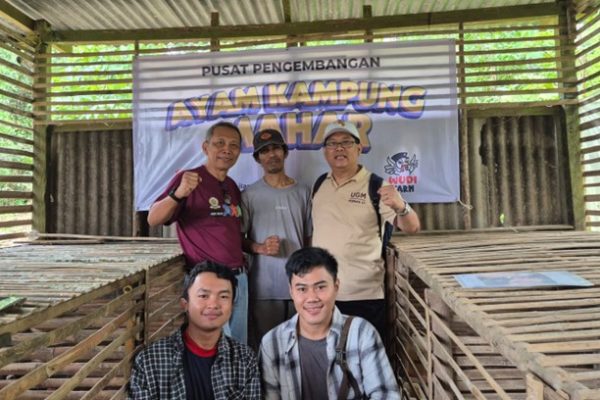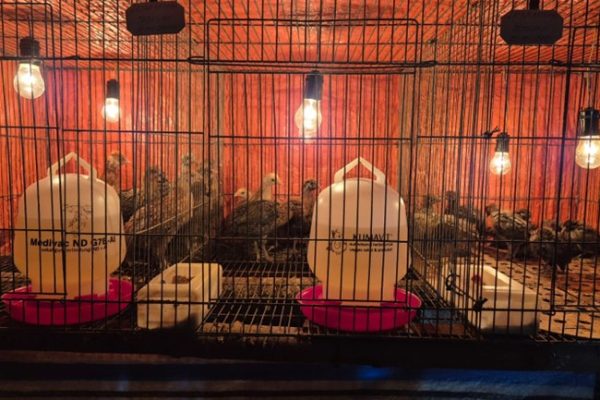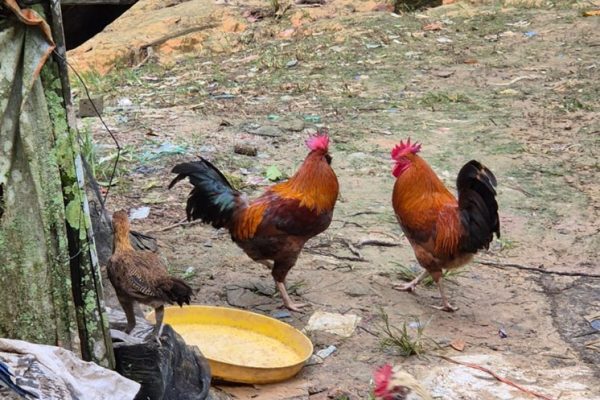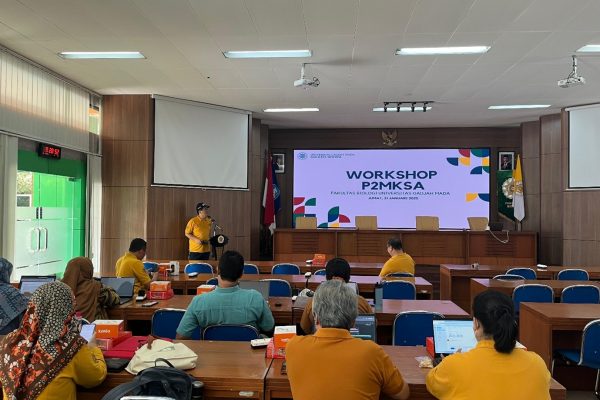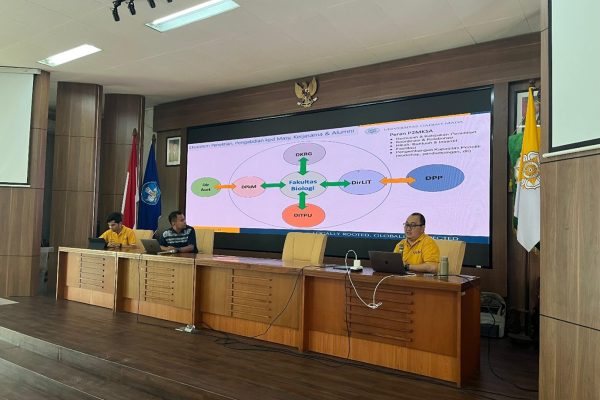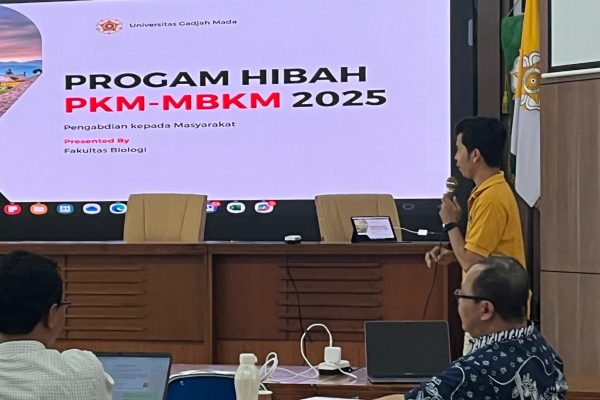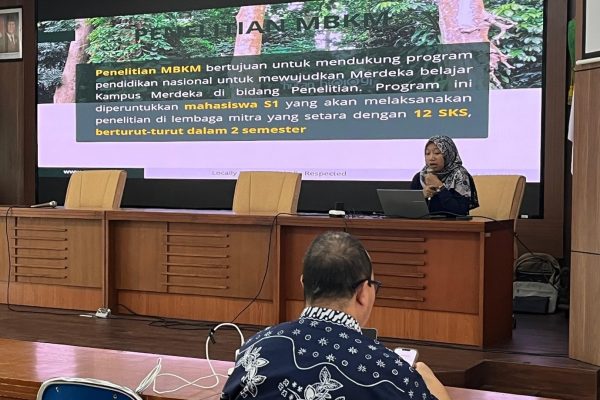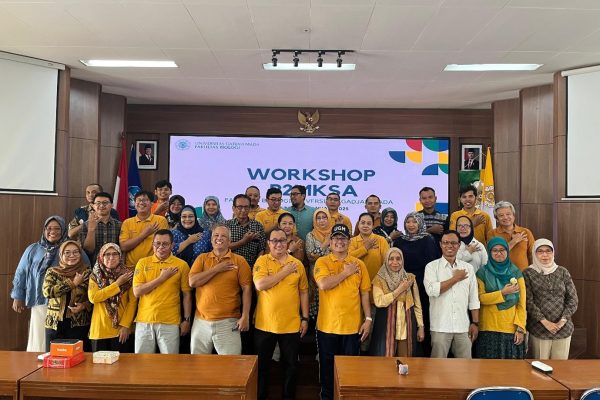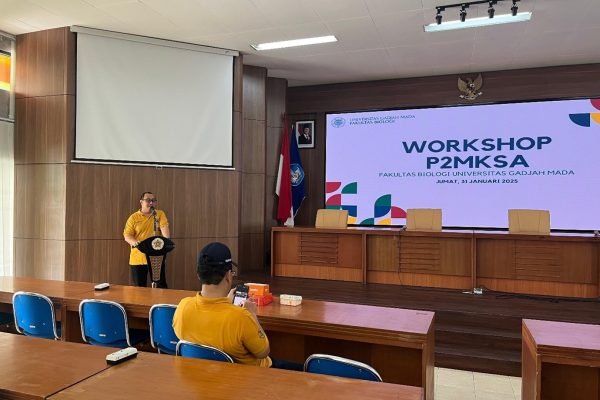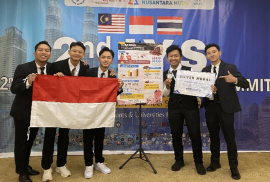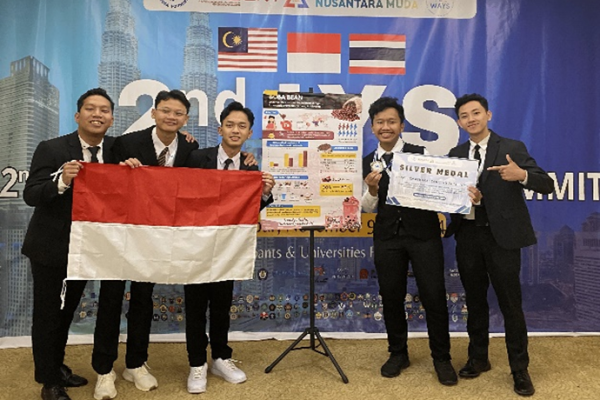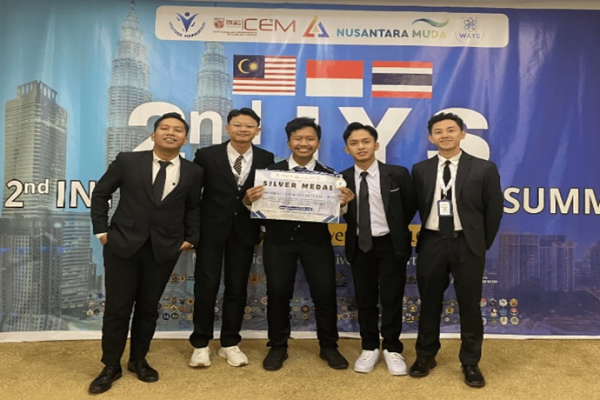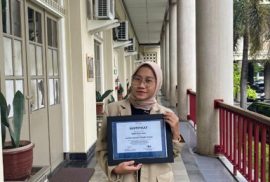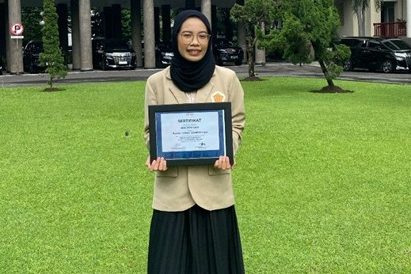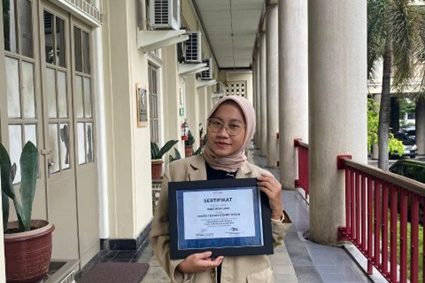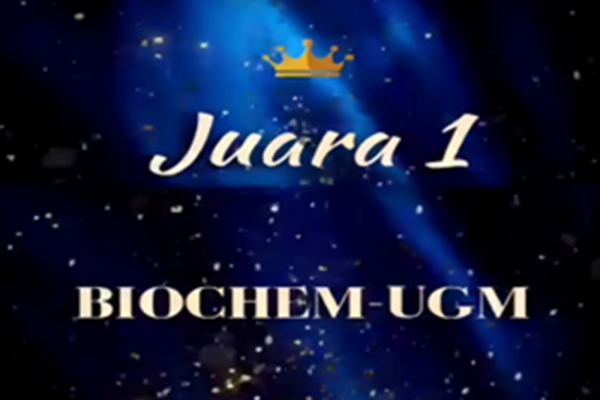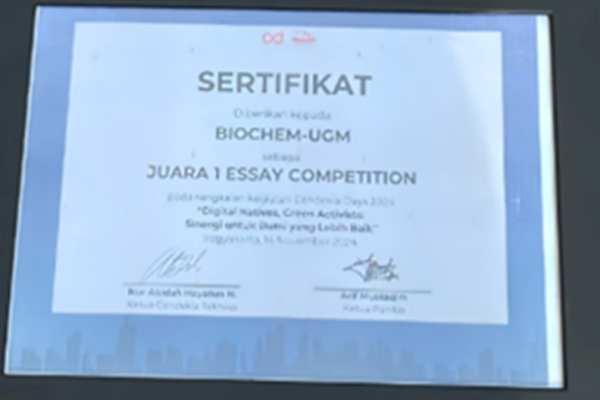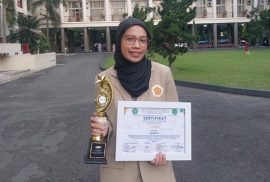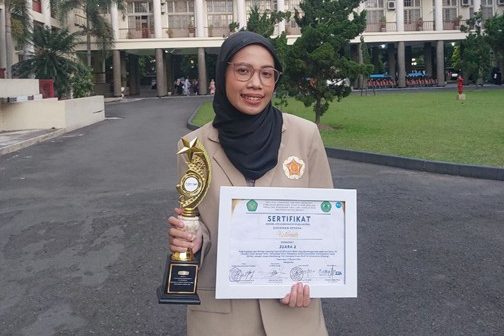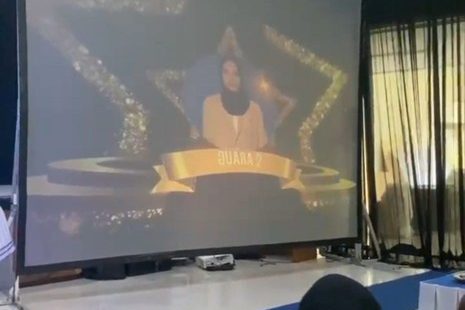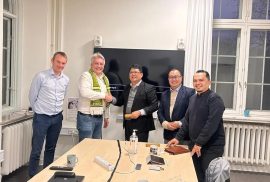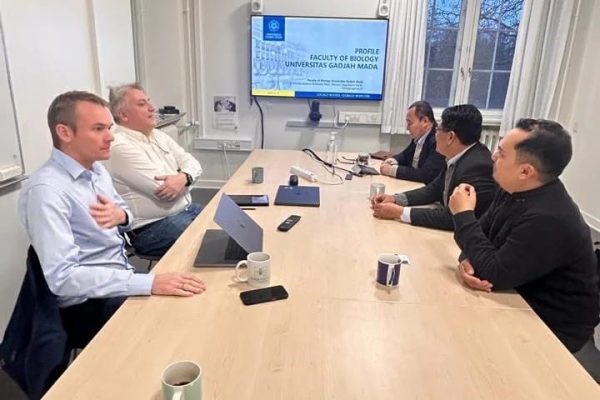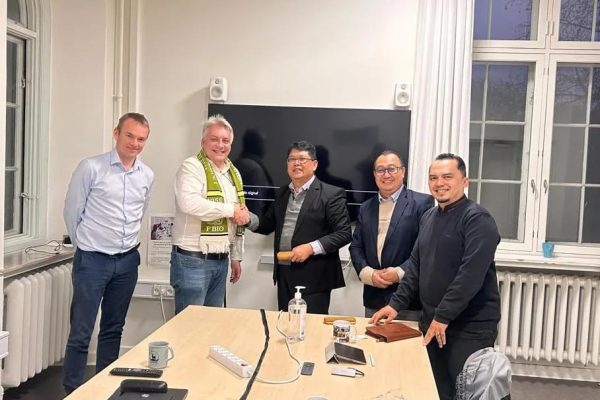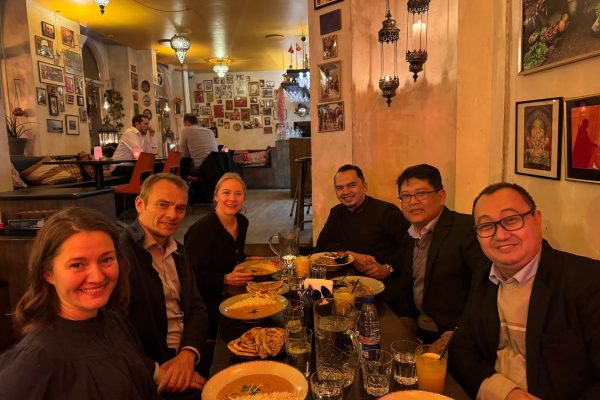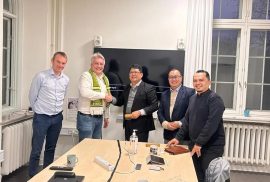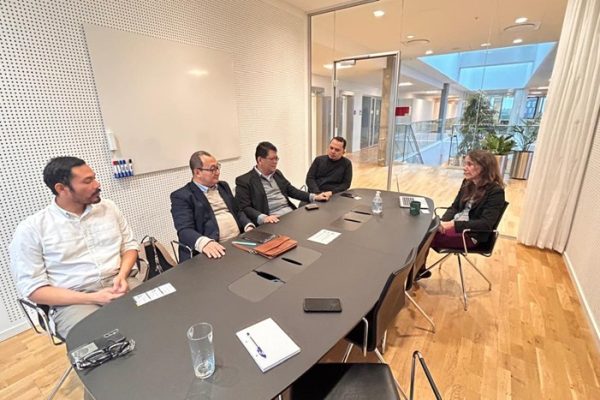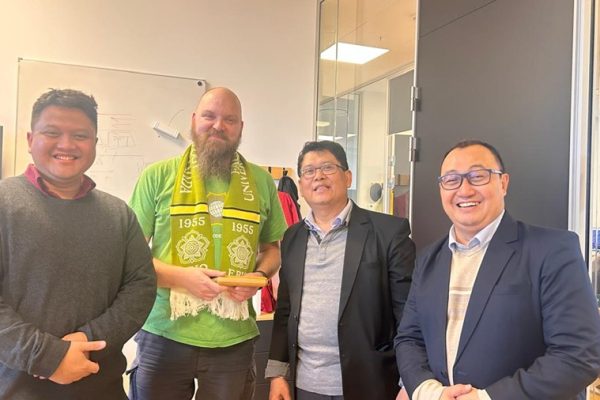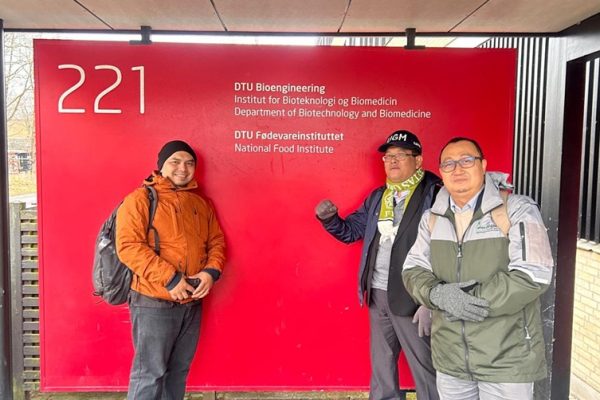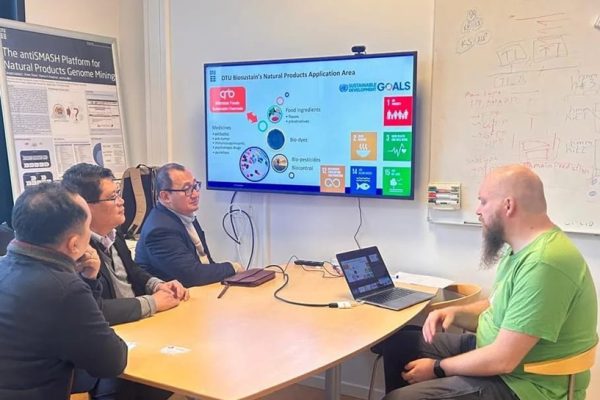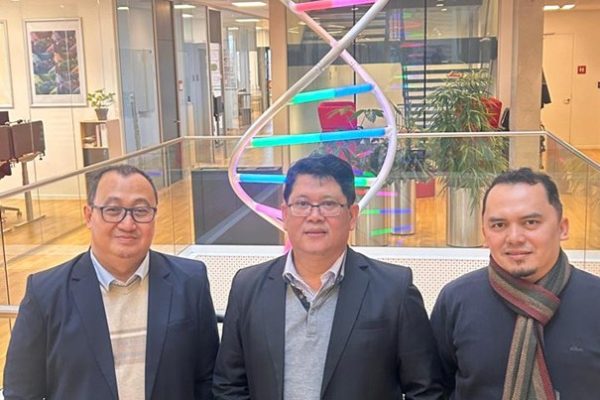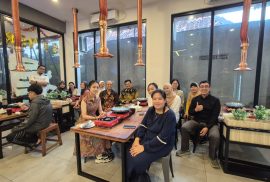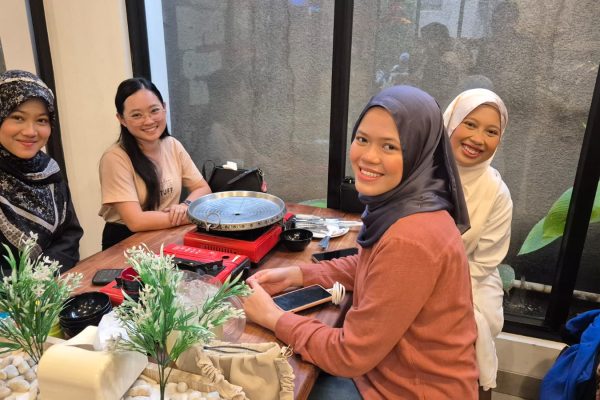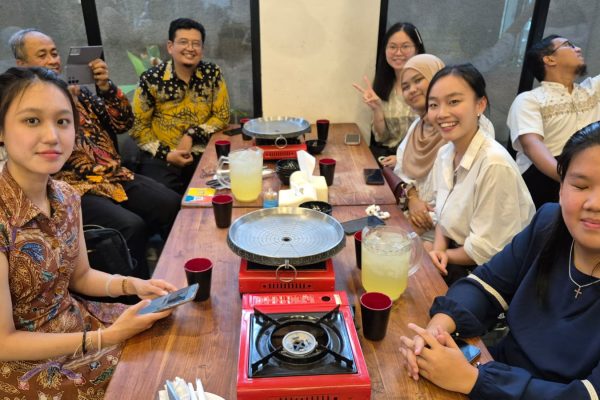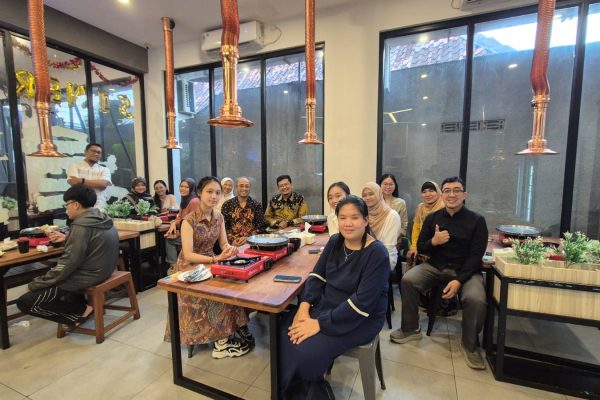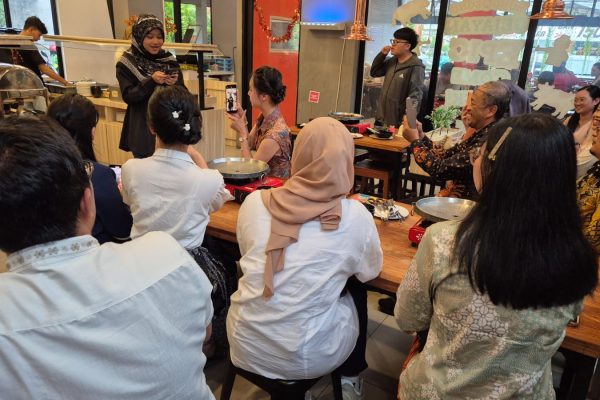Arsip:
Innovation
Faculty of Biology UGM held Biology Open House and Introduction of Research Topics [BIOENTRI] 2025, an event that aims to introduce students to various research topics that can be an option in preparing a thesis, thesis, or dissertation. Through this activity, students have the opportunity to discuss directly with their supervisors according to their fields of expertise, so that they can gain a deeper understanding of the available research.
The event was officially opened on February 10, 2025 by the Dean of Faculty of Biology UGM, Prof. Dr. Budi Setiadi Daryono, M.Agr.Sc. The series of events continued with presentation sessions from lecturers in Room 1, Room 2, and Teaching Lab, as well as research poster exhibitions in the booths that have been provided. Through this forum, students are expected to find research topics that suit their interests and academic plans. BIOENTRI 2025 will run for four days, from February 10 to 13, 2025. This activity received high enthusiasm as evidenced by the presence of students from undergraduate to postgraduate levels.
With BIOENTRI 2025, Faculty of Biology UGM hopes to facilitate students in determining the direction of their research and strengthen the synergy between students and lecturers in the world of research.
BIOENTRI 2025 activities also directly contribute to the achievement of Sustainable Development Goals (SDGs), especially SDG number 4 on Quality Education and have a positive impact on achieving various other SDG targets, including the protection of biodiversity, ecosystem restoration (13, 14, 15), and improving community welfare through innovations in biotechnology and natural resource management (9, 11, 13).
On January 31, 2025, a delegation from the Waste Management Task Force of the Faculty of Biology at Gadjah Mada University (UGM) met with the newly elected Mayor of Yogyakarta, Dr. Hasto Wardoyo, Sp.OG (K), to discuss potential collaborations for waste management in the city. The meeting took place in Meeting Room IV F at Sadewa Hospital, where both parties expressed their commitment to addressing the pressing waste management issues facing Yogyakarta.
The delegation from UGM included prominent figures such as Prof. Dr. Budi Setiadi Daryono, the Dean of the Faculty, Dr. Slamet Widiyanto, M.Sc., the Vice Dean for Finance and Human Resource, Sukirno, S.Si., M.Sc., Ph.D., the Head of the Task Force, and other members including Mr. Suharjita and Mr. Heru. The meeting aimed to explore collaborative efforts to enhance environmental sustainability and improve agricultural productivity through effective waste management strategies.
Mayor Hasto highlighted the alarming statistic that Yogyakarta generates approximately 300 tons of waste daily, necessitating serious management from upstream to downstream. He emphasized the importance of implementing clean technologies and innovative solutions to tackle this issue, which directly impacts food security and the overall health of the local ecosystem.
During the discussion, the Mayor introduced his vision for the “One Village One Sister University” and “One Village One Sister Company” programs. These initiatives aim to empower local communities by fostering partnerships with educational institutions and businesses to create sustainable waste management practices. The collaboration with UGM’s Faculty of Biology is expected to play a crucial role in this endeavor.
The UGM delegation proposed the application of various technological products, including probiotic solutions and organic fertilizers like BIOFERTI, which have been developed to address the challenges posed by organic waste. These products not only help in waste reduction but also enhance soil health and agricultural productivity, contributing to food security in the region.
The meeting also focused on the importance of ecosystem protection and the need for a comprehensive approach to waste management that considers environmental impacts. The UGM team emphasized the significance of educating the community about waste segregation and the benefits of using clean technologies in daily practices.
Both parties agreed on the necessity of conducting further research and pilot projects to assess the effectiveness of the proposed solutions. The collaboration aims to create a model for sustainable waste management that can be replicated in other cities facing similar challenges.
As the meeting concluded, Mayor Hasto expressed his gratitude for the UGM delegation’s commitment to environmental issues and their willingness to collaborate. He reiterated that effective waste management is not just a municipal responsibility but a collective effort that requires the involvement of all stakeholders, including academia, government, and the community.
The partnership between UGM’s Faculty of Biology and the Yogyakarta city government marks a significant step towards achieving the Sustainable Development Goals (SDGs), particularly in areas related to environmental sustainability, food security, and community empowerment. The collaboration is expected to yield innovative solutions that will benefit both the city and its residents in the long run.
The Faculty of Biology, Universitas Gadjah Mada (UGM), through its flagship Gama Ayam research program, has launched a collaborative initiative to promote egg self-sufficiency in Indonesia. In partnership with KAGAMA East Kalimantan and local poultry farmers, the team is cultivating the MAHAR village chicken in Balikpapan, one of the buffer zones of the future capital city, IKN Nusantara.
This initiative is a direct application of UGM’s research innovation. The MAHAR chicken strain originally developed at UGM’s Sawitsari Research Station has been the subject of continued research and refinement under the leadership of Prof. Dr. Budi Setiadi Daryono, M.Agr.Sc., Head of the Gama Ayam Research Team. The cultivation activities include egg collection, hatching, brooding, selection, and breeding to develop a robust and productive indigenous laying chicken strain.
Drs. Lalu Fauzul Idhi, representing KAGAMA East Kalimantan, has played a key role in facilitating regional collaboration. Local farmers, including Mr. Sultan and his team, have already shown promising results, successfully raising the MAHAR chickens to the hundreds in a short period.
To assess progress, the Gama Ayam team visited the Balikpapan site on February 12, 2025, represented by Prananda Imammuddin Dzaki, Yusuf Febrianta, and Prof. Budi. The visit focused on genetic monitoring, performance evaluation, and knowledge sharing related to hatching success and reproductive development.
This program support Sustainable Development Goals (SDGs), especially SDGs No.8 on Decent Work and Economic Growth, by promoting village-based poultry farming; SDGs No.11 on Sustainable Cities and Communities, through local food production initiatives;and SDGs No 17 on Partnerships for the Goals, via committed collaboration between academia, alumni, and the farming community.
The MAHAR chicken is projected to become Indonesia’s leading egg-laying village chicken strain, contributing significantly to Indonesia’s food resilience and rural economic empowerment.
Yogyakarta, January 31, 2025 – The Faculty of Biology, Universitas Gadjah Mada (UGM), held the Research, Community Service, Collaboration, and Alumni Workshop (Workshop P2MKSA) on Friday, January 31, 2025. The event took place at the Auditorium Biologi Tropika from 9:00 AM to 3:00 PM WIB and was attended by all lecturers of the Faculty of Biology UGM.
The workshop was officially opened by Dr. Eko Agus Suyono, M.App.Sc., Vice Dean for Research, Community Service, Collaboration, and Alumni Affairs, along with Prof. Dr. Budi Setiadi Daryono, M.Agr.Sc., Dean of the Faculty of Biology UGM. After the opening ceremony, a group photo session was held to document the event.
In his opening remarks, Dr. Eko Agus Suyono, M.App.Sc., stated that the workshop aims to gather input from lecturers regarding the 2024–2028 Master Plan for Research and Community Service at the Faculty of Biology UGM. This plan will later be submitted to the Faculty Senate for approval. Additionally, in the afternoon session, the P2MKSA team would provide an overview of various research and community service grants offered by the faculty.
“I highly appreciate the role of young lecturers in drafting this Master Plan and other programs. They are the next generation who will lead the Faculty of Biology toward greater progress and innovation,” he added.
“I highly appreciate the role of young lecturers in drafting this Master Plan and other programs. They are the next generation who will lead the Faculty of Biology toward greater progress and innovation,” he added.
Meanwhile, Prof. Dr. Budi Setiadi Daryono, M.Agr.Sc., emphasized that the Master Plan for Research and Community Service is crucial for supporting the faculty’s accreditation process, both for LAMSAMA and other accreditations.
“This Master Plan will be a strategic document that not only guides the faculty’s research and community service but also plays an important role in the accreditation process. With proper planning and the support of all lecturers, we can continuously improve the academic quality and contribution of the Faculty of Biology UGM, both nationally and internationally,” said Prof. Budi.
“This Master Plan will be a strategic document that not only guides the faculty’s research and community service but also plays an important role in the accreditation process. With proper planning and the support of all lecturers, we can continuously improve the academic quality and contribution of the Faculty of Biology UGM, both nationally and internationally,” said Prof. Budi.
Discussion on the Master Plan for Research and Community Service
During the first session, participants received a presentation on the Master Plan for Research and Community Service delivered by Dr. Eko Agus Suyono, M.App.Sc., Dr. Fajar Sofyantoro, S.Si., M.Sc., Dr. Dwi Sendi Priyono, S.Si., M.Si., and Dr. Wiko Arif Wibowo, S.Si. This session provided insights into the research and community service direction to be developed by the Faculty of Biology UGM, highlighting innovations and strategies for implementing research outcomes in society.
Socialization of Research and Community Service Grants
After the break for prayer and lunch, the agenda continued with the Socialization of Research and Community Service Grants, led by Dr. Wiko Arif Wibowo, S.Si., and Dr. Aprilia Sufi Subiastuti, S.Si. The session covered various research and community service grant opportunities available for lecturers at the Faculty of Biology UGM.
The workshop concluded at 3:00 PM with a closing session by the Master of Ceremony. It is hoped that through this activity, all lecturers at the Faculty of Biology UGM will be more actively involved in impactful research and community service, as well as strengthen collaborative networks with various stakeholders.
Kuala Lumpur, Malaysia – A team of students from the Faculty of Biology, Universitas Gadjah Mada (UGM), comprising Muhammad Faris Khiar Calosa and Ridho Nur Alam, successfully secured a silver medal at the International Youth Summit 2024. The prestigious international essay competition took place on November 9-10, 2024, at Universiti Putera Malaysia, Malaysia, where hundreds of participants from various countries showcased their innovations across multiple categories.
The UGM Biology team competed in the Food category, presenting Boba Bean: An Innovative Instant Red Bean Beverage for Anemia Prevention Among Adolescents. This innovative idea captivated the international panel of judges through its creative approach, combining a science-based nutritional solution with current food trends popular among adolescents.
Through meticulous preparation and interdisciplinary collaboration with team members from the Faculties of Cultural Sciences, Engineering, and Pharmacy, the UGM team stood out among competitors, earning this prestigious recognition.
Through meticulous preparation and interdisciplinary collaboration with team members from the Faculties of Cultural Sciences, Engineering, and Pharmacy, the UGM team stood out among competitors, earning this prestigious recognition.
The Boba Bean offers an instant red bean-based beverage rich in plant-based iron and designed to appeal to younger generations who enjoy trendy beverages. By utilizing natural ingredients such as red beans, tapioca flour, and coconut sugar, this product provides a practical solution for increasing daily iron intake and preventing anemia, particularly among adolescent girls who face a high prevalence of this condition. Beyond its nutritional benefits, Boba Bean also excels in flavor and texture, aligning with the preferences of today’s youth.
This achievement highlights not only the research quality of UGM Biology students but also the ability of Indonesia’s younger generation to contribute meaningful solutions to global challenges through relevant and impactful innovations. Specifically, this project supports the achievement of the Sustainable Development Goals (SDGs), particularly SDG 2: Zero Hunger, by offering a nutritious food alternative to prevent anemia, and SDG 3: Good Health and Well-Being.
[Writer: Ridho Nur Alam]
Kotimah, an undergraduate student from the 2022 cohort of the Faculty of Biology, Universitas Gadjah Mada (UGM), secured a remarkable achievement by winning first place in the Essay Competition held during Cendekia Days 2024, organized by UGM’s Cendekia Teknika. Khotimah collaborated with Rahayu Murti Ayuningtyas from the 2022 cohort of the Faculty of Engineering in the ”Biochem” team.
The Cendekia Days Essay Competition is an annual event aiming to promote critical thinking and innovation among students. The 2024 competition carried the theme: “Digital Native, Green Activists: Synergy for a Better Planet.” Participants could choose from sub-themes including energy and the environment, food security, technology and digitalization, creative industries, education, and sustainable development. The event seeks to broaden students’ knowledge in science and technology, foster innovative attitudes, and cultivate their roles as agents of change in advancing green technology for a sustainable future.
The competition, including registration and essay submission, took place from September 21 to October 12, 2024. The finalists were announced on October 26, 2024, with the top eight teams advancing to the final presentation stage on November 10, 2024, followed by the awarding ceremony on November 16, 2024. Among 152 submissions, Team Biochem achieved the highest score during the initial essay evaluation. Team Biochem successfully maintained its leading position and was ultimately awarded First Place.
The Biochem team’s essay focused on the energy and environment sub-theme, presenting their innovative concept of a Sustainable Electric Nanogenerator (SENG). SENG is a groundbreaking green energy solution designed to convert wasted mechanical energy into electricity. The innovation addresses critical environmental challenges, particularly those arising from the hydrodesulfurization process in petroleum refining, which poses significant risks of releasing hazardous per- and polyfluoroalkyl substances (PFAS) into ecosystems. These substances are associated with severe health risks, including cancer, immune system damage, and miscarriages.
The SENG innovation is polymer-based and sulfur-rich, offering three key advantages: economic feasibility, sustainability, and environmentally friendly performance. This breakthrough demonstrates the potential for transformative contributions in renewable energy technologies, aligning with global efforts to address pressing environmental issues.
Author: Kotimah
Yogyakarta – Kotimah, an undergraduate student from the Faculty of Biology, Universitas Gadjah Mada (UGM), has once again achieved a remarkable achievement by securing Second Place in the Biology Scientific Writing Competition. The event was themed “Enhancing the Role of Students in Building a Golden Indonesia 2045 through the Synergy of Culture, Innovative Education, and Ethics to Shape a Quality and Integrity-Driven Young Generation.” with sub-themes that aligned with the 17 Sustainable Development Goals (SDGs).
The competition, including registration and essay submission, took place from August 12 to September 25, 2024. The finalists were announced on October 10, 2024, with the top 3 essays advancing to the final presentation stage and awards ceremony on October 17, 2024, at Universitas Siliwangi in Tasikmalaya.
Kotimah’s essays address the global issue of plastic waste, particularly non-biodegradable polyethylene, which constitutes 35% of annual plastic production. With approximately half of all plastic products being single-use items, polyethylene waste contributes significantly to environmental degradation. Its natural decomposition can take over 500 years, during which microplastics form, disrupting ecosystems and accumulating in organisms. Current disposal methods, such as incineration and chemical degradation, often release toxic substances and require costly catalysts, further complicating the issue.
To tackle this challenge, Kotimah developed a novel approach utilizing lipase enzymes from microorganisms to biodegrade polyethylene. These lipase enzymes, sourced from the anaerobic bacterium Pelosinus fermentans, demonstrated the capability to initiate polyethylene biodegradation.
This environmentally friendly solution presents numerous benefits, such as the ability to be mass-produced using renewable resources while remaining non-toxic, effective, and sustainable. By utilizing biological methods, Kotimah’s innovation provides a viable alternative for addressing the environmental challenges posed by plastic waste.
Author: Kotimah
Copenhagen, 13 December 2024 – The Faculty of Biology, Universitas Gadjah Mada (UGM) has again taken strategic steps in strengthening academic and research networks in the international arena. This time, through a visit to the University of Copenhagen (KU), one of the best universities in Denmark and Europe. KU is ranked 100th in the QS World University Ranking and 40th in the fields of life sciences and medicine.
In an effort to initiate work, the The Faculty of Biology UGM team consisting of Prof. Dr. Budi Setiadi Daryono, M.Agr.Sc. (Dean), Dr. Eko Agus Suyono, M.App.Sc. (Vice Dean for Research, Community Service, Collaboration and Alumni Affairs), and Dr.rer.nat. Abdul Rahman Siregar, M.Biotech., visited the Center for Evolutionary Hologenomics, the Globe Institute, University of Copenhagen on Friday (13/12).
On this occasion, the team met with Prof. Thomas Sicheritz-Ponten who is the director of the Center for Evolutionary Hologenomics (CEH). This study center studies the relationship between the host genome and the microbes that live with it. Microbes are no longer considered passive components, but play an active role in influencing the properties of the host organism. This comprehensive approach is referred to as the hologenomic approach, where the study of the genomes of host organisms and microbes is combined to understand their interactions, the role of these relationships in ecology and evolution, their influence on the development of life on earth, and also how to exploit these relationships for the benefit of humans. CEH uses advanced technology and computational methods to answer these questions through theoretical and experimental research.
Apart from that, the team also discussed with Assoc. Prof. Bent Petersen, who is part of the Computation Biodiscovery research group. Bent introduced one of their research projects, namely “Omics of the Rainforests”. In this research, Bent and his team integrated “omics” data with machine learning algorithms to explore the medical potential and biotechnological applications of biodiversity in the Amazon and Malaysian rainforests. It was on this occasion that the team discussed and explored opportunities to start collaborative research initiatives in Indonesia, through the Faculty of Biology UGM network and also the Indonesian Biology Consortium (KOBI). Dean of the Faculty of Biology UGM, Prof. Budi invited Thomas and Bent to attend the International Conference for Biological Sciences (ICBS) which will be held in October next year. This invitation also provided an opportunity for Thomas and Bent to provide a workshop related to the computational natural drug discovery project.
The Faculty of Biology team also had the opportunity to discuss with Maria Bollerup from Nixie Expedition regarding research collaborations and joint expeditions with the University of Copenhagen. Maria and Nixie Expedition have previously been involved in many collaborative research projects in Indonesia, one of which is the Buteng Expedition together with ROLEX. It is hoped that this will be an opportunity for the Biology Faculty to expand its research collaboration with world partners.
This visit is an important milestone in the Faculty of Biology’s efforts to continue to improve the quality of education and research through collaboration with international partners, especially the University of Copenhagen. This collaboration also reflects the UGM Faculty of Biology’s commitment to supporting sustainable development goals, especially inclusive quality education (SDGs 4) as well as increasing recognition of global partnerships (SDGs 17).
Copenhagen, 13 December 2024 – The Faculty of Biology, Universitas Gadjah Mada (UGM) has again taken strategic steps in strengthening academic and research networks in the international level. This time, through a visit to the Technical University of Denmark (DTU), one of the best technical universities in Denmark and Europe. DTU is ranked 109th in the QS World University Ranking and 5th in the field of Biotechnology based on the Academic Ranking of World Universities (Shanghai Ranking).
DTU Biosustain, a flagship research center under the Novo Nordisk Foundation, was one of the focuses of this visit. This department plays a major role in creating sustainable solutions through the development of microbial cell factories. Since its founding in 2011, this department has given birth to more than 30 start-up companies in the field of biotechnology. This visit was made possible through a connection from one of the Faculty of Biology UGM teaching staff, Matin Nuhamunada, who has just completed his doctoral studies at DTU Biosustain.
In an effort to initiate further collaboration, the Faculty of Biology UGM team consisting of Prof. Dr. Budi Setiadi Daryono, M.Agr.Sc. (Dean), Dr. Eko Agus Suyono, M.App.Sc. (Vice Dean for Research, Community Service, Collaboration and Alumni Affairs), and Dr.rer.nat. Abdul Rahman Siregar, M.Biotech., visited DTU Biosustain on Friday (13/12).
The visit began with a discussion with two group leaders from DTU Biosustain, namely Dr. Pablo Cruz Morales and Dr. Sheila Ingemann Jensen. Dr. Pablo leads research in the field of Yeast Natural Products, with a focus on the exploration and modification of chemicals produced by fungi to develop new molecules such as medicines, sustainable fuels and polymers, in an effort to create a new era of environmentally friendly biochemical industries. Meanwhile, Dr. Sheila leads the Sustainable Microbial Applications group, which focuses on developing molecular tools for bacterial engineering to create efficient microbial cell factories for the production of chemicals from renewable resources such as lignocellulosic waste and CO2 derivatives. This discussion discusses the potential for research collaboration, especially to accelerate bioprospecting of biological resources in Indonesia in a sustainable manner. This discussion also opened up opportunities for lecturers and students at the Faculty of Biology UGM to carry out research visits at DTU Biosustain.
Apart from that, the Faculty of Biology UGM team also met with Dr. Kai Blin, co-principal investigator from the Natural Products Genome Mining research group led by Prof. Tilmann Weber. On this occasion, the team gained insight into the importance of information technology (IT) infrastructure to support the development of bioinformatics research. For example, the antiSMASH analysis service, an antibiotic search software developed by this group, is supported by computing facilities in the form of 8 servers at DTU with a capacity of 784 CPUs and 3 TB RAM. AntiSMASH itself has been used more than 1 million times by various researchers from all over the world and has more than 6,500 scientific citations.
This visit is an important milestone in the Faculty of Biology’s efforts to continue to improve the quality of education and research through collaboration with international partners, especially the Technical University of Denmark. This collaboration also reflects the UGM Faculty of Biology’s commitment to supporting sustainable development goals, especially inclusive quality education (SDGs 4) as well as increasing recognition of global partnerships (SDGs 17).
Yogyakarta, December 13, 2024 – Faculty of Biology Universitas Gadjah Mada (UGM) held a farewell event for Student Exchange Program students on Friday, December 13, 2024, at Bong O Bong Grill, Gejayan. The event was attended by the Vice Dean for Academic and Student Affairs, Dr. Bambang Retnoaji, M.Sc., Head of Undergraduate Study Program Sukirno, M.Sc., Ph.D., Head of International Undergraduate Program, Nur Indah Septriani, M.Sc., Ph.D., Manager of Office of International Affairs, Tyas Ikhsan Hikmawan, M.S., Ph.D., several representatives of lecturers, namely Mrs. Rina Sri Kasiamdari, S.Si., M.Sc., Ph.D., Dr. Miftahul Ilmi, M.Sc., and Mukhlish Jamal Musa Holle M.Env.Sc, D.Phil., and some academic staff.
The event was opened by the Vice Dean for Academic and Student Affairs, Dr. Bambang Retnoaji, M.Sc., who in his speech expressed his high appreciation to the students who had participated in this exchange program. He emphasized the importance of international experience as a strategic step for academic and personal development, as well as broadening students’ global horizons.
The Head of the Undergraduate Study Program Sukirno, M.Sc., Ph.D., on this occasion hoped that this student exchange program could continue to be implemented in the future, providing greater benefits for students and strengthening academic relations between universities in various countries.
The event took place in a warm and lively atmosphere, where one of the representatives of the exchange students, Nur Asma’ binti Mohd Asri, expressed her gratitude in Javanese for the opportunity given through this program.
This year, the Faculty of Biology UGM accepted 11 exchange students from Universiti Tun Hussein Onn Malaysia, Universiti Brunei Darussalam, and Toyo University. This program is a real proof of the efforts of the Faculty of Biology UGM in strengthening international networks and opening wider learning opportunities for students. The Faculty of Biology UGM hopes that cooperation with international universities will continue and grow, providing benefits for all parties involved. [Aulia]

